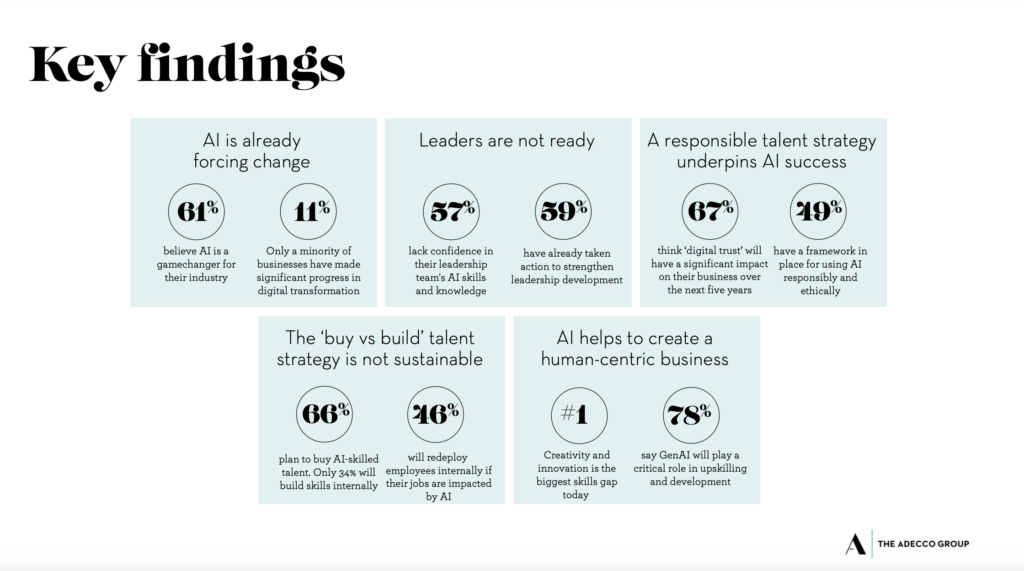
More than half of companies surveyed across key global economies intend to hire fresh talent to manage the widespread integration of Artificial Intelligence (AI) instead of retraining their current employees, found a comprehensive study of C-Suite executives conducted by the Adecco Group, sparking a high demand for digital skills.
The study that surveyed 2000 executives found that a staggering 57% of organisation’s leaders feel their leadership cadre is unprepared to navigate the AI transition, with CFOs expressing even greater uncertainty.
“Our research shows that many leaders don’t have a clear understanding of the disruption that lies ahead. Responsible, human-centric talent strategies will be paramount to manage growing pains and build the right workforce for success, all while creating opportunities for personal growth,” Denis Machuel, Chief Executive Officer, of the Adecco Group wrote in the report.
The study finds that only 43% of the C-Suite group had formal training programs in place to improve AI skills, while only 50% said they guided their staff on how to use AI at work.
“It is imperative that leaders not only urgently deploy AI skills but also ensure it is implemented safely and responsibly by keeping people firmly at the center of this transition,” said Machuel in a statement.
According to the survey, there’s a significant “buy vs. build” disparity in various elements of digital skills. Around 62% of leaders intend to recruit data literacy experts externally, while only 36% plan to reskill or upskill their existing teams. Moreover, 60% aim to hire new talents to address digital literacy gaps, whilst 37% only plan to cultivate skills internally.

AI is seen as a technology that has become influential in various areas of business and leaders, in this survey, say they want to harness its power. 61% of business leaders expect AI to be a game changer for their industry. They anticipate that AI adoption will cause substantial job disruptions across industries. Around 46% plan to reassign employees affected by AI-related job loss, while 41% expect to reduce their workforce within the next five years due to AI tools.
With the increase in demand for AI expertise, salaries are expected to follow suit. The research finds that 37% of leaders anticipate a significant pay rise for AI-related positions over the next year, compared to 24% for white-collar roles and 9% for blue-collar positions.
To thrive in this AI-driven era, an adaptive mindset will help business leaders navigate AI disruption, enabling them to embrace the paradoxes challenging their roles today.
The findings show that businesses are taking action: 81% plan to strengthen leadership development this year, with Canada (90%) and the UK (85%) leading the change.
However, the study finds that it is vital to emphasize the enduring importance of human skills in driving business success. Approximately 57% of the survey highlighted the superiority of the “human touch” over AI in the workplace. Creativity and innovation emerged as the primary areas with the most significant skills gap, as pointed out by leaders.